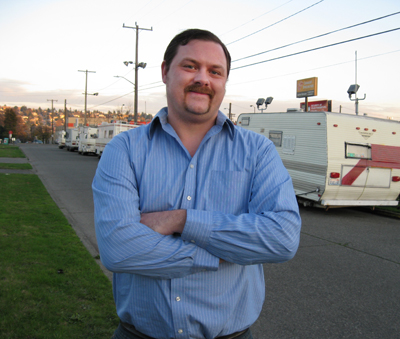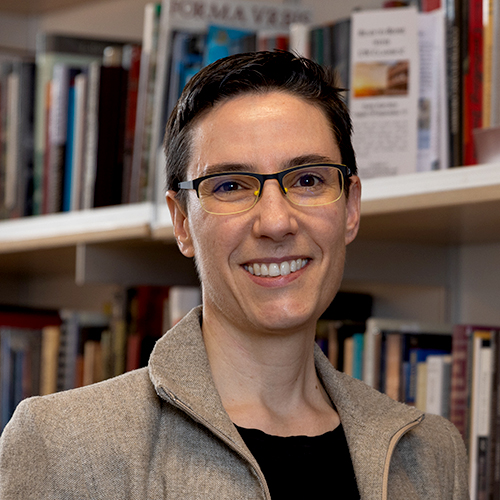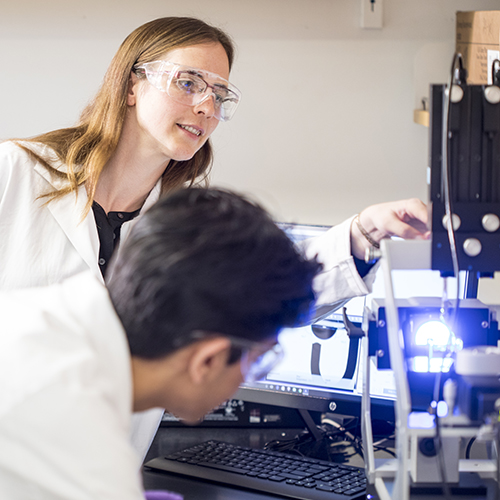Graham Pruss (BA, Anthropology, 2011) knows a thing or two about being homeless, having lived through some tough times on the streets as a teen. So when he noticed a growing number of people living in their vehicles in his Seattle neighborhood, he was determined to help.
That determination led to a UW anthropology honors thesis on vehicle residency, which in turn led to a research fellowship, a leadership role in a community group advocating for the homeless, and meetings with public officials.
To better understand the challenges of vehicle residency, Pruss kicked off his thesis research by spending one week each month for five months living in a 1972 Dodge Travel Ease recreational vehicle in Seattle’s Ballard neighborhood. Ballard, Pruss explains, is home to many vehicle residents in the city’s north end, partially due to its industrial waterfront.

Pruss experienced difficulties the very first day in his RV. “I went to get tabs for the RV and got a ticket for expired tabs and an 'orange tag' notice for parking in one spot for more than 72 hours—despite having had the RV less than a day,” he recalls. (When Pruss argued his case, the police said the 72-hour tag was just a courtesy notice and that he was "lucky" not to get a ticket.) “It had only been 19 hours since I purchased the RV and I already felt like a criminal. It was a whole shift. That already was interesting.”
Pruss quickly discovered that increasingly restrictive parking ordinances have put vehicle residents at risk of losing their “homes” and forcing them to live on the street. Seattle has a city-wide 72-hour limit on parking, and few areas allow overnight RV parking. Oversized vehicles, including large RVs, can only legally park overnight in industrial and manufacturing zones, but an increasing number of those areas now sport “No Parking 2-5 am” signs. “Dealing with the parking issues in my RV, I felt corralled—a word I’d heard from other people. I quickly realized that the parking laws are a huge issue for vehicle residents.”
The risk of parking illegally goes beyond ticketing. A recent ordinance known as the “scofflaw law” allows the immediate immobilization (using a mechanical “boot”) of any vehicle with four or more tickets in collection. If the tickets are not paid within 48 hours, the vehicle may be impounded. After 15 days, it is auctioned off. For people whose only shelter is their vehicle, this turn of events can be catastrophic.
"We have the opportunity to change hearts and minds about people fighting to avoid living completely unsheltered, and to finally offer the largest group of people living on our streets the hand up they so desperately need and deserve."
Pruss felt he could not make recommendations for improving the situation until he fully understood the scope of the problem—that is, how many people in Seattle are living in vehicles. Unfortunately that question has no easy answer. “To keep their lives, property, and homes safe, many vehicle residents actively camouflage their home and distance themselves from it when not sleeping,” Pruss explains. “For many, their survival strategy includes invisibility.”
Shifting his focus from living in an RV to devising better methods of identifying vehicles used as homes, Pruss developed identification guidelines that range from noting excess condensation on windows to the use of curtains or sun shades to block interior views. Then, with a fellow student, he drove around Ballard one day each week for months, mapping likely vehicle residences throughout the neighborhood by vehicle type. Based on his findings, he estimated an average of 200-300 vehicle occupants in Ballard—far higher than previous official estimates of around 50 vehicle occupants for that neighborhood.
Pruss also conducted lengthy interviews with people affected by vehicle residency, including individuals living in vehicles, owners of neighboring businesses, and area homeowners. “The non-vehicle-residents had no idea how many people were living in vehicles,” says Pruss. “Their estimates were extremely low, often in the dozens. People living on the street had a much better idea of what was actually happening, often seeing hundreds of people. Tent cities only allow for 100 people. If there were two tent cities here instead of vehicles scattered throughout the neighborhood, people would take more notice.”
People did, however, take notice of Pruss’s research. He presented his findings at the Society for Applied Anthropology annual conference and received the UW’s 2011 Wienker Award for best anthropology thesis. He was featured on NPR’s All Things Considered and soon had the Seattle Mayor’s Office, Deputy Mayor’s Office, and Seattle City Council requesting copies of his thesis. This in turn led to Pruss’s appointment as chair of the Ballard Community Task Force on Homelessness. He also helped create a scofflaw mitigation program, which provides support to people whose vehicles have been ticketed and are at risk of impoundment.
Since graduating in 2011, Pruss has continued his homelessness work as a research fellow at Seattle University, teaching a course on homelessness and vehicle residency and involving Seattle University students (and four UW students) in his research. Earlier this year, the team summarized its findings in an extensive advisory report that led to meetings with Seattle government officials and resulted in an additional $65,000 in the Mayor’s budget for programs that specifically address issues of vehicle residency.
“That’s just a drop in the bucket, but it’s a step in the right direction,” says Pruss, who notes that Seattle is recognized as one of America’s more progressive cities when it comes to services for the homeless. Pruss also applauds a recently launched pilot “safe parking” program for vehicle residents, even though it provides just a handful of overnight parking spots for live-in vehicles.
“We have the opportunity to give people a chance to use a vital possession, their vehicle-home, not as a blight on communities but as a resource to secure permanent housing, employment, and access to the American Dream,” says Pruss, who recently accepted a position as project coordinator for Seattle University’s Project on Family Homelessness. “We have the opportunity to change hearts and minds about people fighting to avoid living completely unsheltered, and to finally offer the largest group of people living on our streets the hand up they so desperately need and deserve.”
For more about Graham Pruss’s research, read his final report for the Seattle Vehicular Residency Research Project in 2012.
More Stories

Lifting Marginalized Voices — from Ancient Rome
"Interesting, frustrating, and necessary,” is how Sarah Levin-Richardson, professor of Classics, describes her research into the lives of enslaved individuals in the ancient world.

The Truth About Public Speaking
Becoming an effective public speaker requires planning and practice. Professor Matt McGarrity and consultants at the UW Center for Speech & Debate are available to help.

How a Chemistry Lab is Transforming Clinical Research
Ashleigh Theberge's UW lab creates bioanalytical chemistry tools. Some are transforming how clinical studies can be conducted.